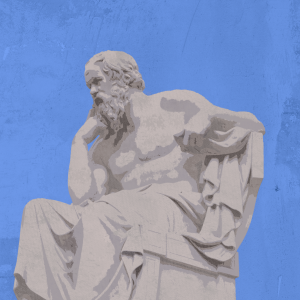What is truth? What does it mean to really know something? And what are the best methods and tools to come to know a thing? In this series we explore the important role our brain and intellect play in truth seeking and the life of faith. Specifically, we want to explore what mental moves are made or what frameworks of thinking are used by intelligent, critically thinking Latter-day Saints whose faith is strengthened rather than damaged by diving deeply into our church’s history and doctrine.

What is truth? What does it mean to really know something? And what are the best methods and tools to come to know a thing? In this episode of Church History Matters, we begin our new series on Good Thinking, where we explore the important role our brain and intellect play in truth seeking and the life of faith. Specifically in this series, we want to explore what mental moves are made or what frameworks of thinking are used by intelligent, critically thinking Latter-day Saints whose …
Just before leaving home for college, 18-year-old Henry Eyring, the future world-renowned LDS scientist, was invited by his father, Edward Eyring, to sit down for some fatherly counsel. After sharing his firm conviction that Joseph Smith was a true prophet whom God used to restore his church, Edward said to his son, “Now, there are a lot of other matters which are much less clear to me, but in this church, you don’t have to believe anything that isn’t true.” Hmm. “In this church you don’t have to …
How can we confidently determine what is and what is not reliable doctrine so we can decide what to believe? This is what Casey and I discussed in our last episode, where we introduced what we called the three doctrinal lenses or criteria by which we can assess the doctrinal reliability of a truth claim. In this episode of Church History Matters we’re going to practice putting these three lenses to work by actually using them to measure and evaluate various theological …
How can we know what actually happened in the past? Whose stories are true? Piecing together accurate history can be tricky business. People in the past, like people today, were diverse. Some were honest; some were not. Some were straight-shooting truth tellers who gave honest, though subjective, accounts of what happened. Others emphasized or omitted specific details in ways that would serve their particular agenda. And others just lied. So how should we …
How can we confidently discern the difference between a reliable historical claim and one that’s not so reliable? This is what Casey and I discussed in our last episode, where we introduced five source critical questions we can all ask to carefully assess the reliability of a historical truth claim. In this episode of Church History Matters, we’re going to practice putting these five questions to work by actually using them to measure and evaluate various historical truth claims about …
A fundamental moment in all good learning is that moment where we modify our assumptions about the world as a result of acquiring new and more accurate knowledge. This, in turn, primes us to make better decisions. On one level, it’s what learning is all about. Sounds pretty basic, right? Well, it is. But it isn’t always easy. Church history can teach us that modifying one’s assumptions can be a challenge for some when it requires them to rethink their ideas about …
Facts don’t interpret themselves. People interpret facts. And the people best equipped to most accurately interpret facts are those who understand the contexts in which those facts were originally embedded. This is especially important in understanding church history, because a fact from church history, especially a potentially shocking or scandalous-sounding fact, isolated from its context, is a fact certain to be misunderstood. This reality is too often leveraged …
“Faith is the substance of things hoped for,” Hebrews 11:1 reads, “the evidence of things not seen.” Hmm. Faith is the evidence of things not seen. Does this mean faith is the evidence we have of things not seen? Could we say it this way? Faith is the level of confidence we feel toward a truth claim or proposed reality which we have not seen, based on the degree of evidence we have accumulated of its truthfulness and existence. Hmm. Maybe. If so, is this why the Lord’s …
In this episode of Church History Matters, Casey and Scott are joined by special guest Dr. Keith Erekson, a church historian. Dr. Erekson wrote an important book entitled Real vs. Rumor: How to Dispel Latter-day Myths. It embodies many of the principles of truth-seeking we have been exploring throughout this series, and then some. Casey and Scott were excited to interview Dr. Erekson about his book and to invite him to demonstrate what those principles look like …
What kind of thinking skills do we need to develop in order to gain and maintain the kind of robust faith we desire? This question is the central subject of a book by Dr. Anthony Sweat entitled Seekers Wanted: The Skills You Need for the Faith You Want. In this book, Dr. Sweat offers keen insights into many of the principles of truth seeking Scott and Casey have been exploring throughout this series, as well as many others. They were excited to interview Dr. Sweat for …
COPYRIGHT 2026 SCRIPTURE CENTRAL FOUNDATION: A NON-PROFIT ORGANIZATION. ALL RIGHTS RESERVED. REGISTERED 501(C)(3). EIN: 39-2827600